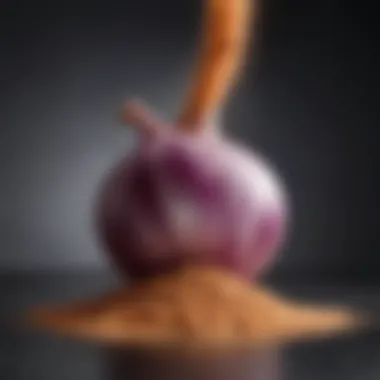Exploring Culinary Versatility of Onion Powder


Intro
Onion powder stands as a staple in many kitchens, heralded for its ability to add depth and flavor to a variety of dishes. The origins of this versatile ingredient can be traced back to the ancient civilizations that first recognized the culinary and medicinal qualities of onions. Today, its production has become efficient, allowing home cooks and professional chefs alike to incorporate it into their culinary repertoire with ease.
The applications of onion powder are vast, spanning across different cuisines and cooking styles. From seasoning blends to marinades, and even baked goods, this ingredient provides a convenient way to enhance flavor without the hassle of chopping onions. Moreover, its nutritional benefits, including antioxidants and vitamins, further solidify its place as a favorable choice for health-conscious consumers.
Understanding the ways onion powder can be utilized, as well as its storage methods, helps ensure that this ingredient retains its potency over time. This exploration seeks to uncover the multifaceted uses of onion powder in culinary practices, tailored for both novices and seasoned chefs. Through this guide, readers will be equipped with the knowledge to utilize onion powder effectively and creatively in their cooking endeavors.
Prologue to Onion Powder
Onion powder is an essential ingredient in many kitchens around the world. Its importance goes beyond just flavor; it serves as a versatile seasoning that can enhance various dishes. Many cooks appreciate the convenience it brings, especially when fresh onions are not available or when simply wanting to save time. This section delves into the definition and historical context of onion powder, allowing readers to grasp its significance in culinary practices.
Definition and Basic Characteristics
Onion powder is made by dehydrating onions and grinding them into a fine powder. This process preserves the flavor while extending the shelf life of onions. Typically, it appears as a yellow or light brown powder. One key characteristic is its concentrated flavor; a small amount can offer a robust onion taste to a dish without adding the moisture that fresh onions would contribute. Its long shelf life when stored properly makes it a favored ingredient among chefs and home cooks alike. It is commonly used in spice blends, marinades, and sauces, adding both umami and aromatic notes to a wide range of foods.
Historical Context and Usage
Onions have been cultivated for thousands of years, with evidence suggesting their use in ancient civilizations like Egypt and Mesopotamia. The transition from fresh onions to onion powder is linked to the need for preserving food and enhancing flavors, especially in times without refrigeration.
Today, onion powder is omnipresent in various cuisines, from American barbecue rubs to Indian curries. It is valued not only for its flavor but also for its simplicity. Many cooks prefer onion powder for its ease of use and consistency in flavor, reducing the variability that can come with fresh onions. Understanding the historical usage of onion powder provides deeper insight into its continued relevance in modern culinary settings.
"The versatility of onion powder transforms simple recipes into extraordinary dishes."
This section sets the foundation for the following segments of the article, which further explore the many dimensions of onion powder.
Production of Onion Powder
The production of onion powder is a crucial topic in understanding its multifaceted applications and benefits in culinary practices. Unpacking this process reveals not only the techniques involved but also the significance of quality in the final product. The journey from onion cultivation to powder form is intricate and directly impacts flavor, aroma, and nutritional value, making it essential for both home cooks and professional chefs.
Cultivation of Onions
The foundation of high-quality onion powder begins with the cultivation of onions. Onions thrive in well-drained soil rich in organic matter. They prefer a sunny location which allows for full growth. Varieties such as Yellow onions, Red onions, and Shallots are frequently grown for drying purposes, with Yellow onions being the most common choice. Adequate watering is also vital, especially during dry spells. Farmers tend to harvest onions when the tops start to fall over, indicating they are mature. The timing of harvest is pivotal, as overripe onions might have diminished flavor characteristics, which can affect the quality of the onion powder produced from them.
Drying and Grinding Process
Once harvested, the next step is the drying process. This step is vital as it reduces the water content in onions, which inhibits spoilage and decay. Typically, onions are sliced into thin rings or pieces and subjected to low heat, either in a food dehydrator or an oven. Ideal drying maintains the onion flavor while eliminating moisture. Once thoroughly dried, the next step is grinding. High-quality dried onions are processed in grinders to produce a fine powder. This powder should be uniform in texture for consistent flavor distribution in recipes. The grinding method can vary depending on the intended use. Finer grinds suit sauces and seasonings, while coarser grinds may be suitable for specific spice blends.
Quality Control Measures
Quality control plays a critical role throughout the production process. From the initial stages of cultivation to the final product, strict measures ensure that only the best onions are used. This may include monitoring factors such as the freshness of the onions, avoiding those with any signs of decay or odor. Additionally, during the drying phase, specific temperature guidelines must be adhered to, preventing burning, which can lead to bitterness. Furthermore, finished onion powder undergoes testing for moisture content, flavor intensity, and potential contaminants. When produced under stringent standards, onion powder retains its essential nutrients and flavors, affirming its role as a valuable ingredient in culinary practices.
"The quality of the onion powder is a direct reflection of the quality of the onions used in its production."
These processes underscore the importance of understanding onion powder production. Knowing these details ensures cooks can better appreciate the value onion powder adds to their dishes. Thus, being informed about its production not only enhances culinary practices but also elevates the standard of food prepared using this ingredient.


Culinary Applications
The importance of culinary applications of onion powder cannot be overstated. As a versatile ingredient, onion powder serves various functions in food preparation, enhancing flavor profiles and introducing unique characteristics to dishes. Its concentrated form provides a depth of flavor, making it a staple for both amateur cooks and professional chefs. Incorporating onion powder not only simplifies cooking but also helps manage the complexities associated with using fresh onions.
Seasoning and Flavor Enhancement
Onion powder is well-known for its ability to season and enhance flavors. Unlike fresh onions, which can overpower a dish if not used carefully, onion powder offers a milder, yet distinct flavor kick. It blends effortlessly with a variety of spices and herbs, serving as a foundational flavoring agent in numerous recipes. Incorporating onion powder is an effective way to boost the overall taste without the added moisture from fresh onions. It finds its way into sauces, dressings, and marinades, providing a savory depth that complements many cuisines.
"Onion powder can elevate your dish while maintaining a balanced flavor profile, ensuring no taste is too overpowering."
In baking, it can enhance the flavor of breads and pastries, while in grilling or barbecuing, it blends perfectly with rubs and seasonings, contributing to a well-rounded taste. This adaptability makes onion powder a noteworthy ingredient in culinary practices.
Onion Powder in Various Cuisines
Different cuisines have embraced onion powder for its unique qualities. In American cooking, it often features in spice blends for meats and vegetables, while in Mexican cuisine, it can provide sufficient flavor to tacos and salsas. Notably, in Indian cooking, onion powder is a staple in many curry blends. Its incorporation in these diverse culinary traditions showcases not just its flavor, but also the ease of use that it brings.
Common examples include:
- Chili powders in Southwestern U.S. recipes.
- Curry powders in Indian dishes.
- Dry rubs for grilling meat.
- Sauces and condiments like mayonnaise for a zesty touch.
This widespread acceptance across different cuisines demonstrates its versatility and the adaptability required to cater to varied palates.
Pairing Onion Powder with Other Ingredients
Pairing onion powder with other ingredients is essential for achieving a harmonious flavor. It works well with many common cooking elements, enhancing their natural tastes. Here are some effective pairings:
- Garlic powder: Combines the two flavors for a robust seasoning mix, suitable for meats and vegetables.
- Paprika: Adds depth of flavor to spice blends, useful in baked or grilled dishes.
- Cumin: Complementary notes that elevate the dish's overall profile, typical in Mexican or Indian cuisines.
- Salt and Pepper: The combination is classic; onion powder provides the base flavor, while the salt enhances overall taste.
Crucially, understanding how to blend onion powder with these ingredients allows for limitless creativity in the kitchen, enabling cooks to experiment easily without losing the essence of the dishes.
The culinary applications of onion powder showcase its essential role across cuisines and cooking methods. Embracing this ingredient allows for innovation and authenticity in cooking.
Nutritional Benefits of Onion Powder
Onion powder is not just a convenient seasoning; it offers significant nutritional advantages that stem from its rich composition of vitamins, minerals, and antioxidants. Understanding these benefits is crucial for anyone interested in enhancing their culinary practices while also boosting their health. The role of onion powder in nutrition is often overlooked, yet it presents a compelling case for inclusion in daily diets.
Vitamins and Minerals Present
Onion powder packs a variety of vitamins and minerals that contribute to overall health. It primarily contains Vitamin C, known for its immune-boosting properties. This vitamin plays a vital role in collagen synthesis, which is essential for skin health. Another essential nutrient found in onion powder is B vitamins, including B6 and folate. These vitamins assist in energy metabolism and the production of red blood cells, which are crucial for transporting oxygen throughout the body.
Moreover, onion powder is a source of minerals such as potassium and manganese. Potassium is known to regulate blood pressure and support heart function, while manganese helps in bone formation and metabolism. Consuming onion powder, thus, contributes to a balanced intake of these vital nutrients, aligning well with healthy eating goals.
Antioxidants and Health Implications
Antioxidants present in onion powder have garnered attention for their potential health benefits. One of the most notable antioxidants in onions is quercetin. This compound has been studied for its anti-inflammatory and anti-histamine properties. Including onion powder in your diet may help reduce inflammation, which is linked to various chronic diseases such as arthritis and heart disease.


Regular consumption of onion powder can also support cardiovascular health. The antioxidants may contribute to lowering cholesterol levels and improving blood circulation. In this way, onion powder serves not only as a flavor enhancer but also as a means of promoting long-term health.
The combination of vitamins, minerals, and antioxidants in onion powder makes it a valuable addition to a balanced diet, promoting both health and flavor.
To sum up, onion powder is a powerful blend of nutrients that can enhance culinary endeavors while also contributing to overall health. Understanding its nutritional benefits is a step toward appreciating this ingredient fully in various food preparations.
Onion Powder vs. Fresh Onions
The distinction between onion powder and fresh onions is significant. Each form offers its own unique benefits and uses, and understanding these differences aids chefs and home cooks in making informed choices. Onion powder is often favored for its convenience, longer shelf life, and concentrated flavor. Fresh onions, on the other hand, bring robust textures and flavors that contribute depth to dishes. Assessing these variations helps clarify their roles in the kitchen and ensures optimal culinary results.
Nutritional Comparison
When it comes to nutrition, onion powder and fresh onions differ in several ways. While fresh onions contain a variety of vitamins and minerals, like vitamin C, B vitamins, and potassium, the drying process of onion powder reduces some of these nutrients. However, onion powder is still a source of antioxidants and may deliver certain health benefits. For instance, a teaspoon of onion powder contains about the same nutritional benefits as a larger quantity of fresh onions, such as fiber and certain antioxidants.
It is important to note that while fresh onions retain more of their natural moisture, onion powder offers concentrated nutrition in a smaller volume. Consequently, it can be easier to incorporate into various recipes without adding bulk. Thus, depending on dietary needs, one might prefer onion powder for its concentrated nutrients, while others may opt for fresh onions for their fresh flavor and higher moisture content.
Flavor Profile Differences
The flavor profile of onion powder is distinct from that of fresh onions. Fresh onions introduce a sharp, pungent flavor that intensifies upon cooking. They also offer a range of textures, contributing both crunch and softness, depending on whether they are raw, sautéed, or caramelized. In contrast, onion powder delivers a more subtle, rounded flavor that is less aggressive. This allows it to blend seamlessly into spice mixes and seasonings.
Onion powder does not replicate the fresh onion's crispness or the complexity it brings when sautéed. However, using onion powder can enhance dishes without the need for chopping or preparation time. Its Earthy taste provides a good option for individuals who may have sensitivity to the strong flavor of fresh onions.
In summary, both onion powder and fresh onions possess unique characteristics that cater to different culinary needs. Understanding these attributes will guide cooks in selecting the ideal form of onion for their recipes.
Storage Techniques for Onion Powder
Proper storage of onion powder is essential for preserving its flavor, aroma, and nutritional properties. Many cooking enthusiasts overlook this aspect, which can lead to diminished quality of the product over time. Understanding how to store onion powder correctly can significantly enhance its longevity and maintain its usefulness in a variety of dishes.
Ideal Storage Conditions
Onion powder should be kept in a cool, dark, and dry environment. Heat, light, and moisture can degrade the quality of the powder, leading to a loss of potency and flavor. Here are some specific conditions to consider:
- Temperature: Ideal storage temperature is between 60°F to 70°F (15°C to 21°C). Avoid placing onion powder near appliances that generate heat or in areas that experience temperature fluctuations.
- Light: Store onion powder in opaque containers to block out light. Exposure to light can lead to increased deterioration of the powder's quality.
- Humidity: Keep onion powder in a low-humidity environment. Moisture can cause clumping and encourage mold growth. Sealing it tightly is vital to avoid moisture intrusion.
- Containers: Airtight containers, such as glass jars or plastic containers with tight-fitting lids, are preferable. These containers help protect the powder not just from moisture but also from air exposure.
Shelf Life and Expiration Considerations
While onion powder can remain usable for several months, its shelf life is contingent on proper storage methods. Onion powder, when stored correctly, can last anywhere from 2 to 3 years for optimal flavor. However, over time, the freshness of onion powder diminishes, which affects its taste and potential health benefits.
Key points to consider for shelf life:
- Expiration Dates: Check the packaging for any digits or estimated expiration dates. While it may still be safe to use beyond this date, flavor and nutritional value might not be optimal.
- Signs of Spoilage: Look for signs like an off odor or discoloration. If the powder has clumped and does not return to a fine texture upon stirring, it may be best to dispose of it.
- Usage Tips: For the best flavor, it is advisable to purchase smaller quantities that can be consumed within a few months. This practice minimizes exposure to air and moisture, ultimately leading to a fresher culinary experience.
Common Misconceptions
Onion powder is often misunderstood in culinary circles. This section addresses some of the prevailing myths and misconceptions that surround its usage. It is essential to clarify these points because they impact how cooks and chefs integrate onion powder into their dishes. Undoing the misunderstandings helps appreciate the true value of this ingredient, which is not only about flavor but also its convenience and versatility.


Myths About Onion Powder Usage
A few notions about onion powder can mislead cooks. One common myth is that onion powder cannot deliver the same flavor impact as fresh onions. While it is true that fresh onions offer different textures and complexity, onion powder can effectively replicate the onion's core flavor. It also delivers a concentrated taste that may enhance certain dishes, such as soups or sauces, where a smooth texture is preferred.
Moreover, some individuals may believe that using onion powder is a shortcut that signifies a lack of culinary skill. This perception often overlooks the fact that professional chefs use onion powder for specific recipes. The quick incorporation and storage characteristics of onion powder can make it a smart choice in various culinary situations. Ingredients like McCormick Onion Powder and others provide chefs with the ability to maintain consistency in flavor without compromise.
Health Concerns and Safety
There are health-related concerns that arise when using onion powder. Some people wrongly assume that it is a highly processed product, diminishing its health benefits compared to fresh onion. In reality, onion powder retains many of the same nutrients as its fresh counterpart, including essential vitamins and minerals. When sourced from reputable suppliers, such as Simply Organic, the safety and quality of onion powder are assured.
However, it is crucial to be aware of specific allergies or intolerances. Individuals with onion allergies should avoid onion powder entirely. Additionally, some brands may use additives that could cause adverse reactions. Consumers must read labels to ensure they select products free from unnecessary preservatives or allergens.
"Understanding the truth about onion powder empowers cooks to utilize it effectively in their kitchens."
Lastly, there might be concerns regarding the sodium content in certain onion powder blends. Not all onion powder is created equal. Some products may contain additional salt, potentially misguiding health-conscious individuals. Those looking to maintain lower sodium diets should be vigilant when choosing onion powder or consider pure varieties with no added ingredients.
Onion Powder in Modern Food Trends
The role of onion powder in contemporary culinary landscapes is noteworthy. As chefs and home cooks alike seek out ingredients that align with current dietary trends, onion powder emerges as a versatile tool. It finds its place not only in enhancing flavors but also in making dishes healthier and more convenient. Understanding the importance of onion powder in today’s food trends sheds light on its multifaceted usage.
Incorporation in Health Foods
Onion powder has gained traction in health food circles for several reasons. First, its concentrated flavor allows for robust seasoning without the need for excessive salt or unhealthy additives. This quality makes it popular among those looking to reduce sodium intake while still enjoying flavorful meals. Second, onion powder retains many of the health benefits associated with fresh onions, such as antioxidants and anti-inflammatory properties. These characteristics appeal to individuals focused on nutritional quality.
Health-conscious brands often include onion powder in their products. For instance, snacks, sauces, and health bars frequently list onion powder as a flavoring agent. This inclusion provides a clean label, appealing to consumers seeking minimal processing. Furthermore, its long shelf life and ease of use make it a preferred option for manufacturers still looking to maintain taste over extended periods.
Role in Vegan and Plant-Based Cooking
As plant-based diets flourish, onion powder serves as a key ingredient that enhances various vegan dishes. Its ability to mimic the flavor profile of fresh onions makes it particularly useful in recipes where raw onion may not be desired. For example, in creamy soups or dressings, onion powder can create depth without the crunch that fresh onions might add. This functionality enhances the palatability of recipes, making them more appealing to a broader audience.
Additionally, onion powder is often found in spice blends tailored for vegan dishes. It complements flavors and balances the overall profile of plant-based meals. Vegan burgers, stir-fries, and roasts benefit significantly from the addition of onion powder, allowing plant-based meals to transform into tasty alternatives without compromising nutrition.
Onion powder not only improves taste, but also serves as a strategic ingredient in health-focused product development and plant-based cooking, ensuring meals are both nutritious and flavorful.
In summary, the utilization of onion powder in modern food trends highlights its versatility and rich flavor profile. As more individuals prioritize health and plant-based eating, onion powder's role will likely expand further.
Ending
Onion powder holds a significant role in culinary practices. Its versatility as a seasoning is unmatched, elevating dishes with ease. This conclusion synthesizes the intricate details explored throughout the article, reaffirming the key benefits and considerations regarding onion powder in modern cooking.
Summarizing Key Points
- Culinary Versatility: Onion powder can be used in various cuisines, from savory to sweet dishes. It adds flavor without the bulk of fresh onions.
- Nutritional Aspects: Onion powder retains many vitamins and minerals found in fresh onions, offering health benefits. Its antioxidant properties contribute to overall wellness.
- Storage and Longevity: With proper storage techniques, onion powder remains viable for long periods, making it a convenient pantry staple. Ideal conditions include a cool, dry place.
- Contemporary Trends: As food trends evolve, onion powder continues to gain attention in health-conscious recipes and plant-based cooking. It aligns with the growing demand for flavor without compromising dietary choices.
"Onion powder serves as a subtle yet powerful ingredient, enriching culinary creations across the board."
The Future of Onion Powder in Culinary Use
The future of onion powder appears bright, especially as chefs and home cooks search for ingredients that combine flavor with nutritional benefits. As the culinary landscape shifts towards more health-oriented diets, onion powder's profile will likely grow further.
- Health Foods: Increased interest in health foods and functional ingredients will elevate onion powder's role in recipes aimed at boosting health without sacrificing taste.
- Plant-Based Diets: With the rise of vegan and plant-based eating habits, onion powder presents a simple way to enhance flavors in vegetable-focused meals. This ingredient seamlessly integrates into diverse dishes, from soups to marinades.
- Innovation in Cooking: Chefs may continue exploring new ways to use onion powder, whether as a seasoning, a thickening agent, or as part of innovative culinary techniques.







